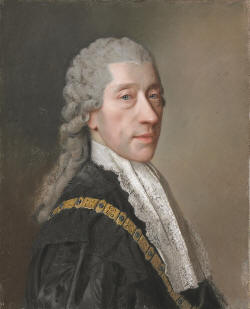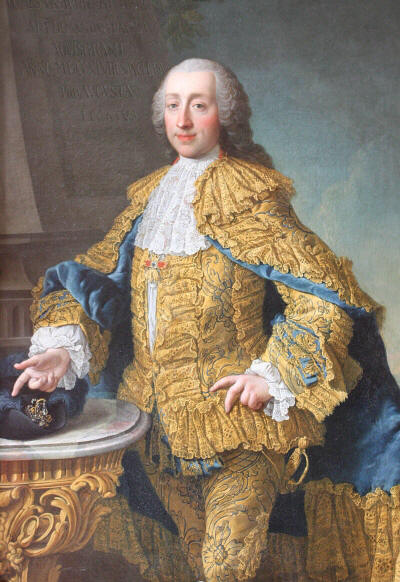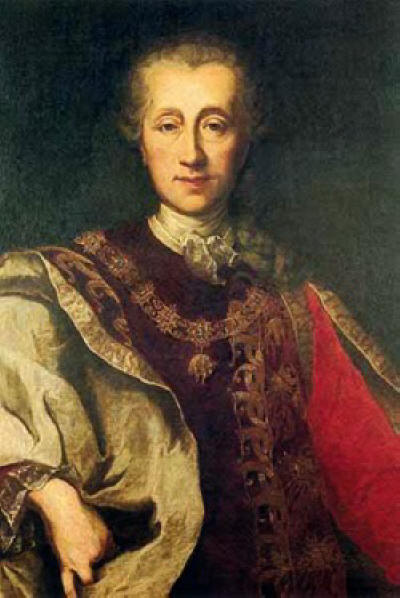Queer Places:
Slavkov Castle near Brno
Chapel of St. John the Baptist, Špitálská 729, 684 01 Slavkov u Brna, Czechia
 Wenzel Anton, Prince of Kaunitz-Rietberg (2 February 1711 – 27 June 1794) was an Austrian and Czech diplomat and statesman in the Habsburg Monarchy. A proponent of enlightened absolutism, he held the office of State Chancellor for about four decades and was responsible for the foreign policies during the reigns of Maria Theresa, Joseph II, and Leopold II. In 1764, he was elevated to the noble rank of a Prince of the Holy Roman Empire (Reichfürst).
Wenzel Anton, Prince of Kaunitz-Rietberg (2 February 1711 – 27 June 1794) was an Austrian and Czech diplomat and statesman in the Habsburg Monarchy. A proponent of enlightened absolutism, he held the office of State Chancellor for about four decades and was responsible for the foreign policies during the reigns of Maria Theresa, Joseph II, and Leopold II. In 1764, he was elevated to the noble rank of a Prince of the Holy Roman Empire (Reichfürst).
Kaunitz was born in Vienna, Austria, one of 19 children[1] of Maximilian Ulrich, third Count of Kaunitz (1679–1746), and his consort Marie Ernestine, Countess of East Frisia and Rietberg (1687–1758), an heiress of the Cirksena dynasty. The Kaunitz family (Kounicové) belonged to the old Czech nobility and, like the related Martinic dynasty, derived its lineage from the medieval Vršovci clan in the Kingdom of Bohemia. First mentioned in the 14th century, they originally lived in the Silesian duchy of Troppau, but in 1509, they moved to Slavkov (Austerlitz) Castle near Brno.
Wenzel Anton's grandfather, Dominik Andreas von Kaunitz (1655–1705), served as a Habsburg Geheimrat and envoy. Elevated to the hereditary rank of a Count (Graf) in 1683, his diplomacy contributed to the 1686 League of Augsburg against King Louis XIV of France and the 1697 Treaty of Ryswick that ended the Nine Years' War. Wenzel Anton's father, Count Maximilian Ulrich, was appointed a member of the Aulic Council (Reichshofrat) in 1706; he served as Imperial envoy and as governor (Landeshauptmann) of Moravia from 1720. By his marriage with Marie Ernestine in 1699, he inherited the immediate County of Rietberg in Westphalia.
Wenzel Anton himself married Maria Ernestine von Starhemberg (1717–1749), a granddaughter of Imperial Chamber president Gundaker Thomas Starhemberg (1663–1745), on 6 May 1736. Four sons were born of the marriage,[2] among them the Austrian general Count Franz Wenzel von Kaunitz-Rietberg (1742–1825). Wenzel Anton's granddaughter Eleonora (daughter of his eldest son, Ernest) married a successor in the office of State Chancellor, Prince Klemens von Metternich.


Empress Maria Teresia of Austria relied on the expertise of Austrian statesman and diplomat Prince Wenzel Anton von Kaunitz-Reitberg throughout her reign, and he furthered her strength in forging an alliance between Austria and France to keep Prussia at bay. For his successes, in 1764 he was made a prince of the Holy Roman Empire as Reichfürst von Kaunitz-Rietberg, and in 1776 was made a prince of the Kingdom of Bohemia.
Unfortunately, his talent and influence went straight to his head. Eccentric, arrogant, conceited and always happy to hear the sound of his own voice, he was accustomed to getting his own way. If what he wanted was a stable of sexy young men, then, by God, nothing would stand in his way; it was reported that he kept a virtual male harem. His wife’s early death forty years before his own left many decades for him to pursue his interests in young men.
Kaunitz had surprising manias. He hated bright light and would not listen to any reports of death, nor approach a sick man; he would not breathe fresh air and kept a handkerchief over his mouth when outdoors. For two years he refused to receive his employer, Austrian Emperor Josef II (son and successor of Maria Teresia), because Josef had returned to Austria sick from battle. Each morning Prince Anton did some riding indoors. He was also consumed by vanity, spending hours each morning preparing his toilet, surrounded by a bevy of handsome male servants, each assigned a particular task.
On the plus side, however, Kaunitz had some good personal qualities – he was astute, laborious and orderly. Plus, his granddaughter married Prince Metternich, his successor to the post of Austria’s State Chancellor.
Joseph II's successor, Leopold II, blamed Kaunitz for the failure and decisively restricted his competences. Kaunitz rejected further rapprochement with Prussia against Revolutionary France in view of the weak rule of Frederick's successor, King Frederick William II, an assessment that was proved to be correct in the War of the First Coalition.
Kaunitz finally resigned his office upon the accession of Emperor Francis II. Kaunitz died in 1794 at his city palace in Vienna and was buried in his family vault beneath the Chapel of St. John the Baptist in Slavkov cemetery.
My published books:


BACK TO HOME PAGE

 Wenzel Anton, Prince of Kaunitz-Rietberg (2 February 1711 – 27 June 1794) was an Austrian and Czech diplomat and statesman in the Habsburg Monarchy. A proponent of enlightened absolutism, he held the office of State Chancellor for about four decades and was responsible for the foreign policies during the reigns of Maria Theresa, Joseph II, and Leopold II. In 1764, he was elevated to the noble rank of a Prince of the Holy Roman Empire (Reichfürst).
Wenzel Anton, Prince of Kaunitz-Rietberg (2 February 1711 – 27 June 1794) was an Austrian and Czech diplomat and statesman in the Habsburg Monarchy. A proponent of enlightened absolutism, he held the office of State Chancellor for about four decades and was responsible for the foreign policies during the reigns of Maria Theresa, Joseph II, and Leopold II. In 1764, he was elevated to the noble rank of a Prince of the Holy Roman Empire (Reichfürst).



